Journal of Digital Technologies and Law @lawjournal-digital
Статьи журнала - Journal of Digital Technologies and Law
Все статьи: 248
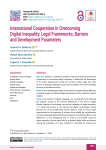
Статья
Objective: based on a systematic analysis of the actual level of international cooperation in overcoming digital inequality, to determine the parameters of its further development, taking into account modern legal and other barriers and global challenges caused by the transition from the knowledge economy to the data economy. Methods: the methodological basis of the research is represented by dialectics, comparative legal and historical legal approaches, and the method of system analysis. Results: the problem of digital inequality was considered in the following key aspects: access to the Internet; differences in the level of digital literacy; features of technology use and the versatility of digital inequality. It is noted that access to the Internet and digital technologies should become one of the fundamental human rights in order to ensure equal opportunities for all segments of society, since initially the crystallization of clearly expressed digital differences is based on the existing offline social differences. It was established that, in order to successfully overcome digital inequality, the key global task is to develop digital skills and literacy among the population. It is also important to stimulate the rational use of technologies and ensure people’s understanding of working with both the technologies and the data obtained through them. The authors propose to expand and deepen cooperation between developed and developing countries so that the latter can produce more data that may serve as a metric and a basis for creating development strategies. At the same time, greater transparency should be ensured by providing effective and accessible means so that the data owner can clearly understand who and why processes their personal data. The article argues that the transition from the knowledge economy to the data economy requires the adaptation of international cooperation strategies to ensure equitable access to both data and their processing. This may accelerate scientific discoveries and support inclusive economic development. The issues of fragmentation and defragmentation of international law are analyzed. Scientific novelty: it is due to the current lack of scientific results concerning the level of international cooperation achieved so far in overcoming digital inequality given the parameters of its systemic development and the main (legal and other) barriers. Practical significance: the study results can be used to improve the legal framework and strategies for international cooperation in overcoming digital inequality to ensure equitable access to data and their processing.
Бесплатно
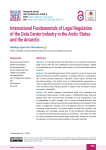
Статья
Objective: to critically assess the effectiveness of existing international legal norms under the new challenges of technological progress, related to the development of the data center industry in the Arctic states and the Antarctic. Methods: the methodological basis of the research is a set of special and general methods of scientific cognition, including methods of comparative law, content analysis, deduction, induction, formal logical method and document analysis. The author turns to interdisciplinary approaches in order to objectively assess the environmental, social and legal risks arising from the data center industry growth in regions with increased climatic and social vulnerability. Results: the article analyzed international legal acts regulating the functioning of data centers in polar regions. It identified the key risks and divided them into environmental (instability of local ecosystems, lack of adaptability to rapid changes, risk of losing biological diversity, and greenhouse gas emissions) and social (marginalization and violation of the rights of indigenous peoples, loss of traditional cultures and lifestyles, increased social tension). The author points out that new conflicts and challenges will inevitably emerge due to the insufficient effectiveness of national and international regulatory mechanisms. The states the need to create specialized international legal instruments taking into account the specifics of the environmental safety of the polar territories. Scientific novelty: for the first time, the article provides a comprehensive analysis of the integral risks and drawbacks of the current international legislation on data center industry in the Arctic states and the Antarctic. The author provides a comparative analysis of the normative framework and shows the inconsistency between the “soft law” principles application on the polar regions and the fourth technological revolution. The author substantiates the requirement to create new certification and reporting procedures throughout the lifecycle of data centers, taking into account the legal and cultural context. Practical significance: the results are focused on improving international and national policies in the sphere of regulating the data center industry and on developing certification and reporting standards that could be effective in the climatic, social and economic conditions of the Arctic states and the Antarctic. The research is aimed at minimizing the negative impact of anthropogenic factors and ensuring a balance between industrial development and the preservation of unique natural and cultural landscapes.
Бесплатно
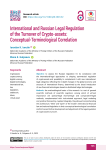
Статья научная
Objective: to assess the Russian legislation for its compliance with the international-legal approaches to shaping symmetrical regulation of crypto-assets and possibility to complement it with new international-legal categories reflecting the in-depth changes in the global economy and structure of international finance, determined by the broad introduction of new financial technologies based on distributed ledger technologies. Methods: the methodological basis of the research is a set of general scientific methods of scientific cognition, among which of utmost importance are special-legal (formal-legal and comparative-legal) methods, complemented with risk-oriented approach, legal modeling and juridical forecasting. Applied integrally, they allowed comprehending the architecture, “letter and “spirit” of the modern international financial law and national legislation in their conceptual-terminological correlation and to forecast further development and adjustment of the legal regulation of crypto-assets turnover. Results: it was found that there appears a stable trend in the crypto-assets turnover regulation, according to which “soft” law dominates among the law sources (this is especially notable in the sphere of international financial law compared, for example, with conventions or international treaties); at the same time, there is a strengthening trend of “fragmentation” of international law with regard to crypto-assets turnover; the authors mark inconsistency of the conceptual framework contained in international acts and in the Russian legislation, as well as the gaps in the regime of crypto-assets turnover at the level of national law; the trends and forecasts are presented referring to the development of international-legal regulation of the sphere of crypto-assets. Scientific novelty: consists, first of all, in a complex comparison, based on, among other aspects, the fundamentally new concepts of regulation of such progressive international-legal categories as cryptoasset, virtual asset, cryptocurrency, stablecoin, etc., some of them rarely used in the Russian legal discourse and actually never applied in legislation. Practical significance: the scientifically grounded proposals are formulated, aimed at improving the conceptual-terminological framework of the Russian legislation in the sphere of crypto-assets turnover, implementation of which will allow constructing a common legal space with the technologically most advanced states, will help to improve investment climate and financial attraction of the state; will improve the national-legal regime of crypto-assets turnover from the viewpoint of not only actual market demands, but also state security interests and improving competitiveness of the Russian legislation.
Бесплатно
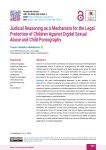
Статья
Objective: to examine the contribution of judicial reasoning to the legislation interpretation, which is aimed at strengthening the legal protection of children against child pornography and digital sexual abuse under the rapid development of cyberspace. The study eliminates the gap in scientific knowledge concerning the possibilities of judicial interpretation as an alternative to the slow process of legislative amendments. Methods: the main methodological approach is the analysis of court decisions on child pornography and sexual abuse of children from 2018 to 2024. The author used comparative legal analysis and the study of judicial practice in various jurisdictions, including decisions of the European Court of Human Rights, the courts of the USA, Great Britain and Ireland. The research is based on a conceptual analysis of the principle of the child’s best interests and its application in judicial practice. Results: the author proved that judicial reasoning is an effective mechanism for overcoming the limitations of legislative formulations in protecting children from online exploitation. The key areas of judicial reasoning were identified: the expansion of the child pornography concept, the inclusion of contactless forms of sexual abuse, the use of digital technologies to collect evidence, and the priority of the concept of the child’s best interests over procedural restrictions. The research confirmed the ability of judicial reasoning to create legal precedents that ensure a more flexible and effective application of existing legislation. Scientific novelty: for the first time, the article comprehensively investigated the role of judicial reasoning as a tool for the dynamic interpretation of legal norms of protecting children from digital sexual abuse. The author developed a conceptual model of the interaction between judicial reasoning and the principle of the child’s best interests. The study reveals mechanisms of overcoming legislative stagnation through judicial interpretation of legal norms related to modern forms of child pornography in cyberspace. Practical significance: The study results can be used in judicial practice to substantiate decisions in cases of child pornography, in law-making activities to improve childhood protection standards, and in the practice of law enforcement agencies. The conclusions help to form a more effective justice system that takes into account children’s interests. The research can serve as a basis to develop methodological recommendations on using judicial reasoning in cases of minors’ protection.
Бесплатно
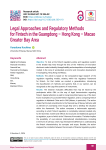
Статья
Objective: To look at the fintech regulatory policy and regulatory system in the Greater Bay Area through the lens of the Trilemma of Innovation doctrine in order to identify the applicability and extrapolation of existing legal models in the zone of accelerated economic and innovation development in Guangdong, Hong Kong and Macau. Methods: The article is based on the comparative legal research of the regulation regarding models, existing within the regulatory framework for fintech. For that matter we conduct a generalization, introducing the classification of methods and systems that, in our opinion, can be recognized as the Lego-like systems of instruments. Results: The research evaluates difficulties that may be faced by the participants within GBA on the way of legal harmonization regarding fintech. Special attention is paid to Hong Kong SAR, being one of the best-known examples of successful fintech regulation, and to comparing fintech regulation in Mainland China and in SAR (Macau, in particular). The author states that the last amendments to the financial law of Macau SAR also add an element of uncertainty, even though they aim to develop the situation within the framework. The author compares a technocratic approach, according to which fintech regulation is completely national (created only for the domestic market and reflects its structure) and traditional approach to regulation, a part of which is the Trilemma of Innovation. The latter implies the possibility of over-national (international) standardization, including in the form of soft law, which may eliminate the difference in understanding the fintech characteristics, its concepts and scope. Besides, the author analyses the correlation between the concepts of financial regulatory system and financial system of fintech regulation, extrapolation of the existing regulatory framework to the developing market of innovative technological solutions and their various models. The author highlights the regulatory response method, changing during the fintech market evolution, and applied, as a rule, together with other approaches. Scientific novelty: the article presents a comprehensive review of the different systems of fintech legal regulation in the Guangdong – Hong Kong – Macau Greater Bay Area, whose unique experience demonstrates various trajectories of the fintech market development in southern China within the “One Country – Two Systems” concept. Practical significance: the main conclusions and proposals resulting from the study are of significant interest for further research, regulatory policy and fintech regulatory system, as Mainland China and the special administrative regions of the Greater Bay Area use different approaches and methods of legal response that have no analogues in the modern world.
Бесплатно
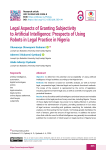
Статья
Objective: to determine the potential and acceptability of using artificial intelligence in legal activities according to the Nigerian law. Methods: the research is based on scientific analysis, as well as formal-legal, comparative-legal, historical-legal and systemic-functional methods. The scope of the research is represented by the norms of legislation, including expired normative legal acts, as well as scientific monographic and periodical literature. Results: It was found that artificial intelligence and robot lawyers are inevitable innovations in the legal practice of many countries, including Nigeria. The use of these digital technologies has proven to be highly effective in activities related to the administration of justice, providing assistance in four areas of legal services: consulting and guidance, searching for materials, data analysis and forecasting the trial results. Technology greatly facilitates the work of lawyers, given the amount of legal services. In addition, the author show that while the use of artificial intelligence may generally be considered justified, the involvement of robot lawyers in legal practice in Nigeria faces both legal and ethical barriers. The laws on legal education and legal practice in force in this country do not recognize robot lawyers as persons licensed to practice law in Nigeria. Robot lawyers must be given the status of a person before they can fully implement their potential in the legal practice of Nigeria. Scientific novelty: this is primarily due to the formulation of a research task to determine the possibility of a robot acting as a practicing lawyer within the legal framework in Nigeria. Practical significance: the conclusions formulated in the paper, namely, the inevitability of using artificial intelligence and robot lawyers in legal practice and the current legislation governing legal practice in Nigeria, will be useful when considering amendments to legislation in order to adapt it to the current level of digital technology development.
Бесплатно
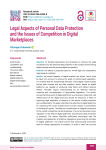
Legal Aspects of Personal Data Protection and the Issues of Competition in Digital Marketplaces
Статья
Objective: to develop approaches and proposals to improve the legal mechanisms for the personal data protection in the context of the evolving digital markets and the growing digital competition. Methods: the article is prepared based on formal legal and comparative legal research methods. Results: the unique features of digital markets are shown, which must be taken into account to achieve the goals of antimonopoly legislation. It is marked that the fundamental elements of the digital market include the big data concept and big data analytics, which, based on digital platforms, are capable of producing many direct and indirect network effects. The latter require understanding for an effective antitrust response and the application of appropriate legislation. The author proves that the growth of digital platforms as a business model and vital infrastructure of the digital economy should be viewed as a factor in improving legal regulation of relations in the sphere of data protection and confidentiality. The paper identifies the potential of digital platforms for assessing the current market power and the impact of competition on limiting this power. The data are considered as an integral component of the overall competitive market landscape. The current European Union regulation in the field of digital platforms and personal data protection is analyzed. The author identifies difficulties associated with the creation and application of effective regulations governing the activities of digital platforms. The article proves that antimonopoly authorities need to change approaches to analytics in order to take into account the distinctive features of digital platforms. It is noted that such changes may require legislative reforms and revision of procedures to match the rapid development of these markets and ensure that any potentially anti-competitive behavior is thoroughly investigated. Scientific novelty: the research contributes to the development of approaches to determining indicators of ensuring the personal data confidentiality under the digitalization of markets and to evaluating the effectiveness of antimonopoly legislation and its application in a new competitive environment. Practical significance: the results obtained can be used as a basis for improving antimonopoly and personal data protection legislation, as well as legal regulation of digital platforms in general.
Бесплатно
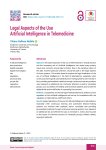
Legal Aspects of the Use Artificial Intelligence in Telemedicine
Статья
Objective: the rapid expansion of the use of telemedicine in clinical practice and the increasing use of Artificial Intelligence has raised many privacy issues and concerns among legal scholars. Due to the sensitive nature of the data involved particular attention should be paid to the legal aspects of those systems. This article aimed to explore the legal implication of the use of Artificial Intelligence in the field of telemedicine, especially when continuous learning and automated decision-making systems are involved; in fact, providing personalized medicine through continuous learning systems may represent an additional risk. Particular attention is paid to vulnerable groups, such as children, the elderly, and severely ill patients, due to both the digital divide and the difficulty of expressing free consent. Methods: comparative and formal legal methods allowed to analyze current regulation of the Artificial Intelligence and set up its correlations with the regulation on telemedicine, GDPR and others. Results: legal implications of the use of Artificial Intelligence in telemedicine, especially when continuous learning and automated decision-making systems are involved were explored; author concluded that providing personalized medicine through continuous learning systems may represent an additional risk and offered the ways to minimize it. Author also focused on the issues of informed consent of vulnerable groups (children, elderly, severely ill patients). Scientific novelty: existing risks and issues that are arising from the use of Artificial Intelligence in telemedicine with particular attention to continuous learning systems are explored. Practical significance: results achieved in this paper can be used for lawmaking process in the sphere of use of Artificial Intelligence in telemedicine and as base for future research in this area as well as contribute to limited literature on the topic.
Бесплатно
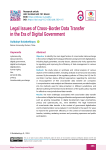
Legal Issues of Cross-Border Data Transfer in the Era of Digital Government
Статья
Objective: to identify the main legal factors of cross-border data exchange in the context of digital technology proliferation and government digitalization, including legal guarantees, security issues, cybersecurity risks, approaches to regulating and improving the efficiency of data management in various jurisdictions. Methods: the study relies on synthesis and critical analysis of various aspects of the stated problem, including analysis of primary and secondary sources. By the example of the regulatory policies of China, the US, the EU and EAEU member states, different approaches regarding the restriction or encouragement of free cross-border data transfer are compared. A comprehensive meta-analysis and literature assessment provided insights into the methods used for data protection in different jurisdictions and allowed outlining the framework and directions of the public policy required for effective cross-jurisdictional data transfer. Results: the main challenges associated with cross-border data transfer in the context of digital technology proliferation and government digitalization, such as growing inequalities in digital development, legal uncertainties, privacy and cybersecurity, etc., were identified. The legal framework of cross-border data transfer in the context of government digitalization and its implementation were analyzed. It contributed to the search for ways to improve the government efficiency in the context of transnational data transfer, including rendering services and promoting openness and public participation. Scientific novelty: based on the analysis of various jurisdictions’ approaches to legal, security and sovereignty issues caused by transnational data transfer, the author reveals the role and applicability of international law, as well as the unique challenges arising in the member states of the Eurasian Economic Union on the way to the formation of transboundary trust space. Practical significance: the study of these issues may help various public agencies, first of all, governmental and legislative bodies to the elaborate well-targeted political and legal decisions, aimed at achieving a balance between data availability and data security, between the effectiveness of public administration and respect for the human rights. The results obtained will also be of importance for other subjects of relations in cross-border data transfer and regulation of these relations.
Бесплатно
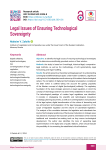
Legal Issues of Ensuring Technological Sovereignty
Статья научная
Objective: to identify the legal issues of ensuring technological sovereignty and to determine scientifically grounded vectors of their solution. Methods: the study is based on formal-legal, historical-legal, comparative-legal methods, as well as the methodology of soft systematicity, legal forecasting, and legal modeling. Results: the article presents a theoretical and legal approach to understanding sovereignty and differentiating its types. Under modern conditions, a significant role is given to the independence and autonomy of the state in the technological sphere. The correlation of digital and technological sovereignty is considered; the latter notion is outlined taking into account the gaining popularity of the Western concept of digital (technological) solidarity. The regulatory foundation of the state strategic autonomy is legal regulation, in which the concept of technology-centrism has been firmly established in recent years. The technological paradigm of modern legal regulations was identified. It consists in strategizing the scientific and technological innovations in strategic planning documents, as well as in sovereignization and cyclization of the legal sphere, digital transformation of the culture of lawmaking and law enforcement, technologization of the legal language, expansion of the scope of legislative regulation and the volume of subordinate legislation. The analysis of the correlation between the legislative and subordinate law levels of technological positioning of the Russian Federation in strategic areas has allowed to emphasize the important systemic interrelation of the involved traditional and innovative law-making tools as they ensure technological development. The author also identifies the risks of expanding legal experimentation in the digital area of public relations, which should exclude the possibility of circumventing the established critical limitations. Scientific novelty: the work forms a theoretical and legal model of ensuring technological sovereignty, which is of strategic importance for the preservation of the Russian Federation sovereignty in its classical understanding as the main and most important feature of the state. Practical significance: the results can be used in law-making activities of public authorities to create legal mechanisms for research, development and implementation of critical and end-to-end technologies and the production of high-tech products based on them in order to ensure national security of the Russian Federation.
Бесплатно
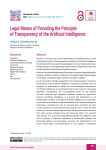
Legal Means of Providing the Principle of Transparency of the Artificial Intelligence
Статья научная
Objective: to analyze the current technological and legal theories in order to define the content of the transparency principle of the artificial intelligence functioning from the viewpoint of legal regulation, choice of applicable means of legal regulation, and establishing objective limits to legal intervention into the technological sphere through regulatory impact. Methods: the methodological basis of the research is the set of general scientific (analysis, synthesis, induction, deduction) and specific legal (historical-legal, formal-legal, comparative-legal) methods of scientific cognition. Results: the author critically analyzed the norms and proposals for normative formalization of the artificial intelligence transparency principle from the viewpoint of impossibility to obtain the full technological transparency of artificial intelligence. It is proposed to discuss the variants of managing algorithmic transparency and accountability based on the analysis of social, technical and regulatory problems created by algorithmic systems of artificial intelligence. It is proved that transparency is an indispensible condition to recognize artificial intelligence as trustworthy. It is proved that transparency and explainability of the artificial intelligence technology is essential not only for personal data protection, but also in other situations of automated data processing, when, in order to make a decision, the technological data lacking in the input information are taken from open sources, including those not having the status of a personal data storage. It is proposed to legislatively stipulate the obligatory audit and to introduce a standard, stipulating a compromise between the technology abilities and advantages, accuracy and explainability of its result, and the rights of the participants of civil relations. Introduction of certification of the artificial intelligence models, obligatory for application, will solve the issues of liability of the subjects obliged to apply such systems. In the context of professional liability of professional subjects, such as doctors, militants, or corporate executives of a juridical person, it is necessary to restrict the obligatory application of artificial intelligence if sufficient transparency is not provided. Scientific novelty: the interdisciplinary character of the research allowed revealing the impossibility and groundlessness of the requirements to completely disclose the source code or architecture of the artificial intelligence models. The principle of artificial intelligence transparency may be satisfied through elaboration and provision of the right of the data subject and the subject, to whom the decision made as a result of automated data processing is addressed, to reject using automated data processing in decision-making, and the right to object to the decisions made in such a way. Practical significance: is due to the actual absence of sufficient regulation of the principle of transparency of artificial intelligence and results of its functioning, as well as the content and features of the implementation of the right to explanation the right to objection of the decision subject. The most fruitful way to establish trust towards artificial intelligence is to recognize this technology as a part of a complex sociotechnical system, which mediates trust, and to improve the reliability of these systems. The main provisions and conclusions of the research can be used to improve the legal mechanism of providing transparency of the artificial intelligence models applied in state governance and business.
Бесплатно
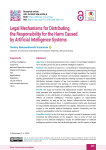
Статья
Objective: to formulate proposals to form a system of subsidiary liability for harm resulting from the use of artificial intelligence systems. Methods: the research is based on a comprehensive methodological basis, including the abstract logical method for theoretical understanding of the legal nature of artificial intelligence as an object of legal regulation; the method of comparison to analyze the Russian and European legislations on tort liability; generalization to systematize the existing concepts of responsibility distribution between subjects of law; and correlation analysis to identify the relationships between the typology of artificial intelligence systems and the mechanisms of legal responsibility for their functioning. Results: the study summarizes and systematizes modern theoretical and legal concepts and regulations of the European Union and the Russian Federation on the distribution of subsidiary responsibility for the adverse effects of artificial intelligence. Potential subjects of responsibility were identified, as well as the key factors influencing the distribution of responsibility between them. A multidimensional matrix was developed for responsibility distribution between the subjects, taking into account their impact on the specific artificial intelligence system functioning and the systems typologization under the risk-based approach. Scientific novelty: for the first time, an original concept is proposed, which combines the differentiation of the subjects’ roles in terms of their real impact on the artificial intelligence results; the differentiation of artificial intelligence systems under the risk-based approach; and the system of legal presumptions of responsibility distribution corresponding to the above two classifications. The novelty lies in the creation of a multidimensional matrix of subsidiary liability, which allows taking into account many factors when determining the subject of responsibility in each specific case of harm caused by artificial intelligence systems, which differs significantly from existing unilateral approaches to this issue. Practical significance: the research conclusions and suggestions can be used to develop the doctrine of subsidiary responsibility in the field of artificial intelligence use, to develop and modify the legal norms regulating artificial intelligence. The proposed multidimensional matrix of responsibility distribution can serve as a theoretical basis for improving judicial practice in cases of compensation for damage caused by artificial intelligence systems, as well as for creating an effective balance between stimulating the development of AI technologies and ensuring the protection of the rights and legitimate interests of individuals and legal entities.
Бесплатно
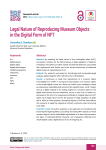
Legal Nature of Reproducing Museum Objects in the Digital Form of NFT
Статья научная
Objective: by revealing the legal nature of the nonfungible token (NFT), to propose a solution for the topical issues of legal regulation of relations emerging in the sphere of online market and Internet platforms, associated with reproduction and further use in the virtual environment of tokenized digital copies of original pieces of art. Methods: the research was based on formal-legal and comparative-legal analysis, applied together with methods of law interpretation. Results: a conclusion is made that reproduction of a museum object in the digital form of NFT is not equal to reproduction of a museum object in the simple digital format, as it does not contain such mandatory criteria as uniqueness, indivisibility and scarcity of the specific token. An NFT object acts as a digital original of an analog original of a museum object in the digital environment and the metaverse, not as a new form of media art. Expressed in the form of a uniqueness certificate of a digital object, an NFT object, by its legal nature and for the purpose of legal regulation of deals with it, refers to “other property” among the objects of civil law, which allows the museums to apply the respective contract constructs when structuring such deals. Scientific novelty: the author proposes a new approach to considering and improving the legal regulation, accounting and storing NFT objects as virtual museum objects, the so-called digital equivalents of an item, which possess the signs of individual-definite character and uniqueness, differing from simple digital copies, digital pieces of art, 3D mapping, etc. Practical significance: the research results can be used for improving legal regulation of museum activity, correcting the civil and museum legislation, in particular, for defining virtual museum objects; for implementation of law, for example, when signing deals on using and selling NFT objects, in terms of specifying the content and volume of authorities of the right holders of the nonfungible token.
Бесплатно
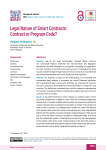
Legal Nature of Smart Contracts: Contract or Program Code?
Статья
Objective: due to the rapid technological changes, digital economy and contractual relations determine law transformation and legislation development towards adaptation to prospective spreading and application of smart contracts in civil and commercial turnover. In this regard, the study focuses on determining the legal essence of smart contracts as a fundamental step towards the development of their timely and clear regulation. Methods: the research is based on the methodology of formal-legal and comparative legal analysis. It compares the current Bulgarian legislation with supranational legal sources and identifies the characteristic features of smart contracts as demanded instruments necessary for modern law and economy. The article also compares them with the classical understanding of contracts, making it possible to understand and define the nature of smart contracts more accurately. Results: it was determined that a smart contract is a software code in which the parties predetermine conditions under which the contractual relationship between them is created, modified and terminated. The research proved that the contract execution does not depend on the action or inaction of its parties, but rather on the occurrence of a predetermined condition (a certain fact relevant to the parties) under which the contract must self-execute. It was substantiated that the will of the parties cannot be changed or replaced because of the special way in which the smart contract is recorded in a distributed ledger. It is found that the fundamental problem of transferring the will from the legal language to the program code of the smart contract persists: if the will of the parties is incorrectly transferred to the program code, the smart contract may self-execute, but its execution will not be the result that the parties counted on. Scientific novelty: the analysis made it possible to compare the current national (Bulgarian) legislation and supranational (European) law. It revealed the vagueness of smart contracts regulation, both at the national and international level, and identified a number of issues in need of scientific and legal interpretation, which refer to the legal nature of smart contracts in view of the self-executing program code concept. Practical significance: the study can serve as a basis for further development of legislation towards its adaptation to the prospects of smart contracts spreading and application in civil and commercial turnover. It also allows an in-depth analysis of the smart contracts practice referring to such unsolved problems as accurate transference of the parties’ will to the program code (translation of specific terms from the legal language into the smart contract program code), electronic identification of subjects – parties to the transaction and many other issues.
Бесплатно
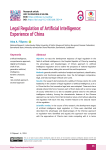
Legal Regulation of Artificial Intelligence: Experience of China
Статья
Objective: to trace the development trajectory of legal regulation in the field of artificial intelligence in the People’s Republic of China by revealing the advantages and disadvantages of China’s approach to artificial intelligence regulation and to outline the prospects of national regulation for the nearest future, taking into account the world experience. Methods: general scientific methods of analysis and synthesis, classification, systemic and functional approaches. Also, the formal-legal, comparative-legal, and historical-legal methods were used. Results: the research demonstrates the validity of Chinese claims for world leadership in the creation of legal regulation of artificial intelligence, as it is in China that the first normative legal acts were adopted. These acts have already entered into force; however, each of them deals with a narrow range of issues, while there is no law to establish general rules for the artificial intelligence industry. Among the characteristic features of the Chinese approach we can name, first of all, its iterative nature, which allows adjusting the regulation with each new step. Another feature is the sectoral nature of the regulation. Scientific novelty: in the course of the research, the development stages of artificial intelligence legal regulation in China were identified and described; the advantages and disadvantages of the Chinese approach to regulation were identified and argued; this approach was compared with the approaches of China’s main rivals competing with it in terms of the technology development and its legal regulation. All of the above allowed making conclusions about the subsequent development of legal regulation in China and in the whole world. Practical significance: familiarization with the research materials enables interested legal scholars, and not only them, to get a clear idea of the level of artificial intelligence regulation, achieved by China. China’s experience is of significant interest to the rest of the world, showing the correctness or faults of possible regulatory options in the new and complex field. The study results can be used in the practice of legal regulation in the sphere of artificial intelligence, as well as in preparing lectures in the relevant courses and writing tutorials for law students.
Бесплатно
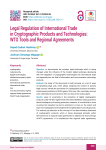
Статья
Objective: to demonstrate the complex legal landscape which is being changed under the influence of the modern digital landscape developing with the integration of cryptographic technologies into international trade and especially into the field of information and communication technology products. Methods: the study of the documents is built primarily on a set of ways of interpreting legal acts, which allows analyzing the content of primary legal sources, namely the provisions for cryptographic products circulation, and proposing solutions to fill the gaps in this area. Also, secondary sources were collected and summarized to form an idea of the study subject. Results: areas of uncertainty in the protection of digital cryptographic products under the WTO agreements have been identified, raising questions about the adequacy of existing protection measures. It is noted that in some countries this situation has led to restrictions or bans on the import and export of cryptographic technologies and encrypted data on security grounds. The authors pay attention to the concept of non-discriminatory treatment of cryptographic products, which is being developed primarily within the framework of regional trade agreements to address the shortcomings of WTO agreements. It is emphasized that regional trade agreements, although stimulating cooperation and competition in international trade, demonstrate various approaches to the regulation of cryptographic products. The authors note that this creates challenges for business and it must be prepared to take into account the specificities of regional agreements, local legislation and evolving legal requirements. A conclusion is made that it is important to balance the innovation protection with the promotion of trust and cooperation, between the cryptographic technologies development and the issues of security and intellectual property rights protection. Scientific novelty: a vision of the complex legal landscape surrounding cryptographic products is presented, showing the differences in approaches to regulating relations around digital and non-digital products under WTO agreements and approaches to regulating cryptographic products applied in regional trade agreements. Practical significance: the study results are of interest to government agencies, policy makers, commercial entities and individuals involved in international trade in cryptographic technologies, as they can help all stakeholders to make informed decisions, navigate the complexities of regulating these relationships and advocate for fair treatment in the evolving digital trade environment.
Бесплатно
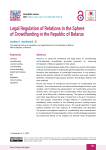
Legal Regulation of Relations in the Sphere of Crowdfunding in the Republic of Belarus
Статья научная
Objective: to study the theoretical and legal bases of crowdfunding and to elaborate scientifically grounded proposals for improving the Republic of Belarus legislation in this sphere. Methods: the methodological basis of the research is a system of principles, methods and techniques of studying the general regularities of emergence, formation and development of social-legal phenomena. In the research, general and specific methods of scientific cognition were used: analysis, synthesis, comparative-legal, logical, systemic, formal-legal, dialectic and other methods. Results: the history of emergence and formation of crowdfunding was analyzed. The social-economic and technical-technological factors were revealed, which facilitate the popularization of crowdfunding among the Internet users. The origins of the “crowdfunding” notion were discussed, as well as its filling with a definite meaning. The types of crowdfunding were listed, depending on the goal of investment on the part of investors. The main subject composition of legal relations in crowdfunding was established, which consists of the following persons: funding seeker; funder; operator of online-funding service. The overall algorithm of legal relations between the main subjects of crowdfunding was described. The positive and negative aspects of crowdfunding were characterized. An overall analysis of foreign legislation in the crowdfunding legal regulation was performed. Based on the analysis, the general trends of legislation development were presented. The program and normative legal acts on developing crowdfunding in the Republic of Belarus were reviewed. The probable contract models of the parties’ legal relations registering were named. The technical and legal requirements to the functional of an online-funding service were determined. The minimal necessary set of measures was proposed, which may prevent risks and threats associated with procurement and extension of funds through online-funding services. Based on the operator functions, specific requirements to the rules of online-funding service were determined. Scientific novelty: the author comprehensively studied the notion, legal nature and features of legal regulation of crowdfunding. The factors were revealed, which influence the formation of the legal norms regulating the procurement and extension of funds through online-funding services. The author elaborated proposals for improving the Republic of Belarus legislation in the sphere of social relations under study. Practical significance: the research results are significant for developing the studies in the sphere of civil, economic, and informational law. The obtained results may be used in teaching a course in civil, economic, and informational law, as well as be applied by law subjects when elaborating and introducing the respective drafts of laws and be an object of further scientific research on the issue.
Бесплатно
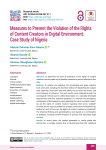
Статья
Objective: to determine the level of protection of the rights of content creators in social media and to develop measures to prevent offenses in this area. Methods: to achieve the objective, the sociological and legal cognitive tools were used, including the doctrinal method of researching the subject area, obtaining “first-hand” data and taking into account the factors and circumstances of influence. The main results were obtained through the sociological method used to collect data based on a specially developed questionnaire with four research questions: (1) what are the perceptions and opinions of third parties or users regarding the role of a content creator? (2) are the rights of content creators regarding their works violated? (3) what are the ways to protect the created content from infringement by platforms? and (4) how can the rights of content creators be protected? The empirical findings and generalizations were based on a combination of analyses, including content analysis of primary and secondary legal sources. Results: In recent years, the content generation in social media has evolved into a complex industry that is transforming both the traditional understanding of creative expression and the implementation of intellectual property rights. Using the Nigerian experience as a case study, the authors examine the rights and protection measures provided to digital content creators under intellectual property law. The study shows that there is currently not enough scholarly work in this area or developed legislation to protect the social media content. It is concluded that there is a need for improved legislation on the protection of rights in the sphere of social media content. In the absence of such legislation, creators of online works should resort to more radical methods in enforcing their rights in order to reduce intellectual property misappropriation. Creators of such works are suggested to ensure the protection of their rights based on the fair use doctrine principles. Scientific novelty: the study is structured around research questions concerning infringements and remedies for content creators. The questions were addressed to respondents from different countries, a large proportion of whom specialize mainly in content creation in various social spheres through several media platforms and social networks. Practical significance: the article conclusions and recommendations may minimize the risks of infringement of intellectual property rights of content creators, which may arise with the widespread use of social networks, as well as increase the level of protection of rights to works created in the form of online content.
Бесплатно
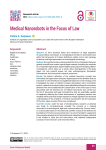
Medical Nanorobots in the Focus of Law
Статья научная
Objective: to form doctrinal bases and mechanics of legal regulation of using medical nanorobots; to conceptualize the idea of nanorobotics law within the frameworks of its basic definitions, safety norms, risks, typology of devices, and legal parameters of technological terminology. Methods: the cognition tools are represented in the form of integration between general scientific and modern special legal methods (including the methods of comparative legal studies, legal modeling and juridical forecasting, NBICS-convergence), which, taken as a whole, allow distinguishing in the study object not only juridical proper, but also anthropological, biomedical, informational, and mechanistic research projections. Results: the author’s definition of the medical nanorobot concept was formulated; the legal content and quasi-legal aspects of the definition that are important for the theoretical and applied development of terminology were investigated; the signs of related concepts (biomedical robot, nanorobotic system, medical nanorobotic system) were identified and logical connections between them were established; the classification of the main types of risks associated with the practical use of medical nanorobots was carried out; the list of theoretical and legal contradictions that are potentially capable of negatively affecting the future development of regulatory practice was revealed; the Russian and foreign experience of legal regulation and doctrinal understanding of the problems of medical nanorobotics (by the examples of the USA, Japan, Europe, China) was considered. Scientific novelty: under the lack of interdisciplinary research, an attempt was made to comprehensively consider the concept of a medical nanorobot in a technological, legal and communicative way (“human robot” on a nanoscale) based on the advanced scientific research that defines the foundations of the future nanorobotic law. It is recommended to supplement the synergetic development of biomedical and related technologies, reflected in the models of robot law and robot ethics, with relatively independent concepts of nanorobot law and nanorobot ethics. Practical significance: based on the analysis of the legal regulation system in force in Russia and abroad, mechanisms for improving domestic legislation were identified, including taking into account the achievements of juridical crowdsourcing. Within the framework of socio-humanitarian issues, a contribution to the development of legal, sociological, and psychological science is formed. A scientific and methodological basis was prepared for further legal research and law-making activities in the field of medical nanorobotics.
Бесплатно
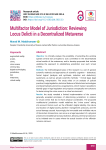
Multifactor Model of Jurisdiction: Reviewing Locus Delicti in a Decentralized Metaverse
Статья
Objective: to critically analyze the possibility of extending the existing spatial criminal law principles to acts committed in the decentralized virtual worlds of the metaverse, and to develop proposals that include updating the approach to establishing jurisdiction over such virtual crimes. Methods: the methodological basis of the research is a set of general scientific methods and approaches of scientific cognition – dialectical, formal logical (analysis and synthesis, induction and deduction), systematic, as well as private scientific methods – formal legal, legal modeling, interpretation. The study relies on an analysis of judicial practice, foreign legislation, technical features of blockchain technologies and decentralized autonomous organizations, which makes it possible to identify gaps in legal regulation and propose conceptually new solutions for determining the crime scene in a virtual environment. Results: the study revealed a limited implementation of the current generally accepted principles of determining jurisdiction in relation to virtual crimes that do not have physical coordinates. The proposed multifactorial jurisdiction model redefines the “crime scene” taking into account factors such as the offender’s digital identity, the nature and location of digital assets, platform management protocols, and the actual damage caused. Assumingly, the immutable and verifiable nature of blockchain transactions can serve as a legal equivalent of a physical presence to establish personal jurisdiction, allowing criminal prosecution to be initiated even in cases where the actual location of the offender remains unknown. Scientific novelty: the paper presents an approach that implies the fundamental transformation of reactive, adaptive legal regulation principles into a proactive, comprehensive framework designed specifically for the unique challenges of the metaverse. A paradigm-changing hypothesis was put forward: that a permanent (stable) digital footprint of the offender in virtual spaces can serve to exercise jurisdiction. The model systematically presents the idea of harm as the most important link between virtual offenses and their consequences in the real world. Practical significance: it is currently impossible to apply legal norms and rules to relations in the metaverse, taking into account their specifics. The main provisions and conclusions of the study can be used to improve the mechanisms of legal regulation of the metaverse and to form international protocols on data exchange and mutual legal assistance for searching and collecting evidence based on blockchain technology. They may help to develop legislative initiatives aimed at creating integrated legal mechanisms that are scalable and resistant to rapid technological changes, characteristic for the digital environment.
Бесплатно

